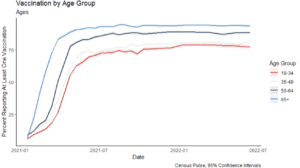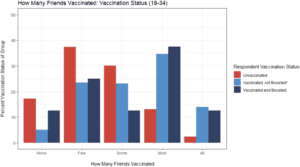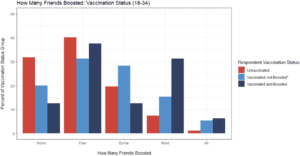When the pandemic started in 2020 Young Invincibles immediately sprung into action to better understand how young adults were experiencing and interpreting what was happening around them. The intensity of the disruptions to economic security, health and wellness, and daily routine was unprecedented in living memory. They fell especially hard on young adults just beginning to make their way in a world turned upside down and inside out.
On the rapid development of Covid-19 vaccines, Young Invincibles, enabled by generous support from the Commonwealth Fund, began a listening tour to understand how young people were reacting to these medical breakthroughs, how well they understood their implications, and what attitudes, fears, and concerns needed to be addressed to make sure young adult vaccine uptake was as high as possible. Young Invincibles’ listened to young people on the front lines of public health outreach, conducted focus groups of young adults around the country, and fielded a 2022 national survey of young adults both vaccinated and unvaccinated.
It’s no secret that young people have been especially challenging to reach with Covid-19 vaccines and boosters. Young adult uptake lagged older populations long past the timing gaps we might expect from different initial vaccine eligibility and has plateaued at a rate 10-15 percent below that of retirement-age Americans. Is this because young people aren’t worried about Covid and consider themselves to be, ahem, invincible?

The truth is more complicated. After conducting multiple rounds of qualitative and quantitative research, and three years of leading a major public health outreach campaign to promote young adult vaccination, we’ve come to understand the major challenges in vaccinating young adult populations and the best strategies to overcome those challenges. As the pandemic unwinds, we’re reflecting on some lessons learned:
1. Young people know they aren’t invincible, but they do need information. Covid-19 vaccination has, unfortunately, become an item of political controversy in this country. That means that disinformation and misinformation about the vaccine is widespread, and young people need the tools and resources to separate accuracy from fallacy. Young adults expressed concerns about side effects, efficacy, infertility, and about persistent and persistently-disproven myths. Misinformation needs to be countered, countered clearly, and countered from sources that young adults trust.
“I’m a student worker, so I actually had the ability to get the vaccine super, super early, and I remember setting up my appointment – I was so nervous! I didn’t feel comfortable, I didn’t do a lot of research, I didn’t hear a lot of stuff, so I canceled my appointment.” – Mia, 20 years old
2. Maximize accessibility and convenience. Young adults by definition have less experience than their older peers navigating the ins and outs of the American health care system. The complexities of insurance, the nightmarish experience of trying to find out how much health services cost, and the tenuous connection that many highly mobile young adults have with their health providers leads to skepticism that unfamiliarity only compounds. This means that, for young people, it is especially important to make the vaccination process as accessible, convenient, straightforward, and cost-free as possible. If young adults have to navigate complex bureaucracy and pay large out-of-pocket fees for vaccines and boosters, public health will suffer.
“… I got two shots. It was inconvenient for that very reason because I had to get a ride both days and it was way far out and I don’t have a car so I had to make sure I was free, I had to make sure somebody else was free, and that was kind of annoying.” – Margot, 24 years old
“I have friends who are smart and progressive who are waiting and hesitant. The history of using or not using vaccines and medication when Black people need it or don’t creates hesitancy.” – Kalkidan, 19 years old
3. Altruism works. Evidence does suggest that young adults are less personally concerned about Covid-19 than their older peers. Given that older people are in fact the most likely to face the severe immediate symptoms of a Covid-19 infection, this alone isn’t all that surprising. Young adults have consistently shown, though, that they are concerned about Covid-19’s impact on their more vulnerable relatives and friends. In the wake of the Pandemic’s worst months, the ability to see friends and family safely was a major vaccination motivator, and the dangers Covid poses to young peoples’ community at large is not lost on them. Particularly when, for better or worse, much of American life has returned to pre-2020 normalcy, emphasizing how important it is to stay vaccinated and boosted for others needs to be a key part of any ongoing vaccination outreach strategy. Young people need to know that they can and should help keep those around them safe.
4. Messages need to come from more than one place. During our work, we’d find ourselves occasionally asked what message and which messenger represented the silver bullet for young adult vaccination. No such one-size-fits-all solution exists (though, as we’ll talk about in a moment, peer outreach is particularly important). Young adults, rather, need to hear consistent and accurate public health messaging from multiple sources. Young adults are likely to make good decisions regarding vaccines when their experience on social media matches the messaging they get from TV news, and is reinforced by what they hear at their job or in school, on top of similar messaging from family, friends, and peers. When those sources provide incomplete, misleading, or contradictory information, outcomes are more mixed.
5. Peer outreach is effective. In 2022, more than a year and a half into a nationwide vaccination campaign, YI conducted a national survey of both vaccinated and unvaccinated young adults to help understand continuing roadblocks to both initial vaccination and booster uptake. One finding that jumped out of the data concerned the importance of young adults’ peer groups. Vaccinated young adults tend to have vaccinated friends. Unvaccinated young adults tend to have unvaccinated friends. This finding underscores the power of social influence in shaping young adults’ health behaviors. It suggests that efforts to increase vaccine uptake among young adults should prioritize peer outreach and peer-led interventions that can help shift social norms around vaccination. By engaging with and mobilizing young adults’ social networks, we can help create a culture of vaccination that supports the health and well-being of all members of our communities.


The Covid-19 pandemic has brought to light the unique challenges faced by young adults in accessing and understanding public health information. Through its research and outreach efforts, Young Invincibles has identified key strategies for improving young adult vaccine uptake, including maximizing accessibility and convenience, emphasizing altruism, delivering consistent messaging from multiple sources, and leveraging the power of peer outreach. As we continue to navigate the pandemic and other public health challenges, it is critical that we prioritize young adults’ needs and perspectives to ensure that everyone has the information and resources necessary to stay safe and healthy.
